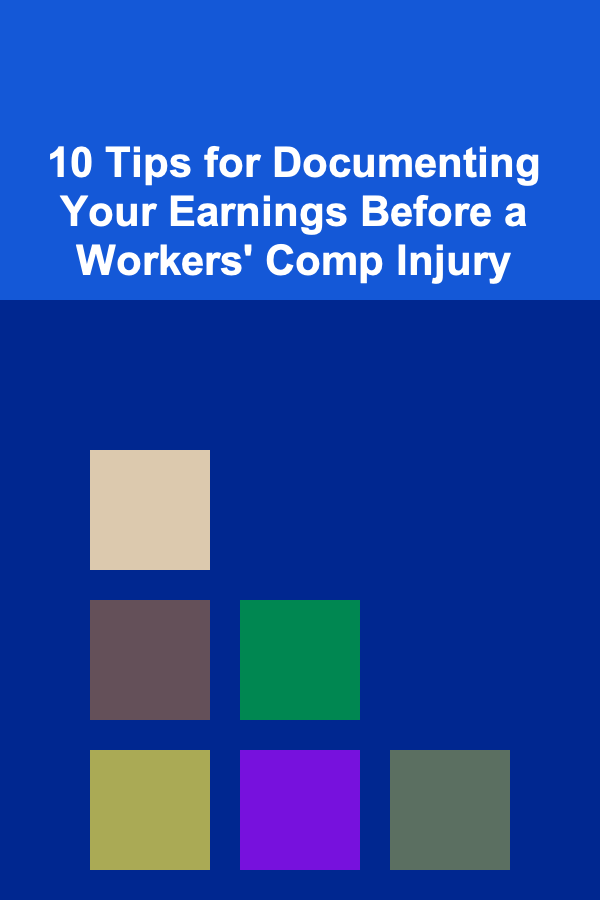
10 Tips for Documenting Your Earnings Before a Workers' Comp Injury
ebook include PDF & Audio bundle (Micro Guide)
$12.99$8.99
Limited Time Offer! Order within the next:

When it comes to filing a workers' compensation claim, accurate documentation of your earnings prior to the injury is one of the most critical aspects of the process. Properly documenting your earnings can significantly affect the compensation you receive and ensure that you are fairly compensated for your lost wages. Many people overlook this crucial step, often assuming that their employer or the workers' compensation insurer will automatically have the necessary information. However, the reality is that accurate and thorough documentation is something that needs to be actively managed by you.
Whether you are currently employed full-time, part-time, or as a contractor, documenting your earnings properly can help establish your income baseline, making it easier for you to prove your earnings and receive appropriate compensation for your work-related injury. In this article, we will explore 10 essential tips for documenting your earnings before a workers' comp injury to ensure that you are adequately prepared should an unfortunate incident occur.
Track Your Earnings Regularly
One of the best ways to ensure that your earnings are accurately documented is by keeping a consistent record of them. Whether you are paid weekly, bi-weekly, or monthly, make it a habit to track your income as you go along. Relying on memory or waiting until a workers' comp injury occurs may lead to inaccuracies or missed details.
- Maintain a Record: Create a system for recording the amount you earn each pay period. This could be a spreadsheet, a physical ledger, or a digital application that tracks your income automatically. The more often you update this record, the more reliable it will be.
- Review Your Pay Stubs: Make sure to compare your self-recorded earnings with the pay stubs provided by your employer. This ensures that any discrepancies are caught early, and you can address them before a claim is needed.
Keep Copies of All Pay Stubs
Pay stubs are some of the most reliable forms of evidence when it comes to proving your earnings. These documents provide a clear breakdown of your wages, including any deductions or overtime pay.
- Organize Pay Stubs: Organize your pay stubs in a way that is easy to access and review. You can store them physically in a folder or digitally in a cloud storage service or an accounting software program.
- Ensure Completeness: Ensure you have the most recent and past pay stubs available. For workers' compensation claims, typically, you will need your earnings history from the 12 months preceding the injury.
Document Overtime and Bonuses
If your income varies based on overtime or bonuses, be sure to keep detailed records of these additional earnings. This can significantly affect the compensation you receive in a workers' comp claim.
- Track Overtime Hours: Make sure to document the number of overtime hours you worked and the corresponding pay you received for these hours.
- Record Bonuses and Commissions: If your income is supplemented by performance bonuses, commissions, or tips, keep separate records of these as well. Pay attention to the specific terms under which these bonuses are issued, as they may be considered part of your overall earnings for compensation purposes.
Keep Records of Any Unpaid Time Off
Workers' compensation benefits are often calculated based on your average weekly wage (AWW). If you have taken unpaid time off for any reason before your injury---such as vacation days, sick leave, or personal time---it's important to document these periods.
- Track Unpaid Leave: Maintain a record of any unpaid time off you've taken, including the dates and reasons for the leave. This can help ensure your AWW is accurately calculated by workers' comp insurance.
- Include Unpaid Absences in Earnings Calculations: When calculating your average wage, consider how unpaid leave might affect the overall number of working hours and the total wage you earned.
Keep a Record of All Benefits Received
If your compensation includes benefits such as health insurance, retirement contributions, or paid time off, these can also be relevant to your workers' comp claim. While these benefits aren't directly part of your take-home pay, they contribute to your overall compensation package.
- Document Benefits: Include detailed information about the value of any employer-provided benefits, such as health insurance premiums or retirement fund contributions. These figures could potentially affect your final compensation.
- Verify Benefit Statements: Ensure that statements from your employer regarding benefits and deductions are accurate, and retain copies of these statements for reference in case of discrepancies.
Utilize Bank Statements for Proof of Income
If you receive direct deposit or payments that aren't reflected in a pay stub or paycheck, bank statements can serve as another crucial form of evidence for your earnings.
- Highlight Deposits: Go through your bank statements carefully and highlight any income deposits from your employer. Cross-reference this information with your pay stubs to ensure consistency.
- Record Frequency and Amounts: Document the amount and frequency of payments that are deposited into your bank account. This information can be used to verify your regular earnings when filling out a workers' compensation claim.
Track Inconsistent or Fluctuating Income (For Contractors and Freelancers)
For contractors, freelancers, or those in gig work, income can fluctuate significantly from month to month, making it difficult to document. However, it's just as important to keep thorough records of your earnings as it is for salaried employees.
- Keep Detailed Invoices: Create a system for tracking invoices, payments, and any fluctuations in your income. For freelancers, the amount earned might vary depending on the number of clients or projects worked on.
- Use Accounting Software: Consider using accounting software designed for freelancers and contractors. These tools can help automate the process of tracking income, categorize payments, and generate reports that will be useful if you need to document your earnings for workers' compensation.
Keep Track of Work-Related Travel and Expenses
In some cases, workers' compensation may cover additional costs related to your work, such as travel or business expenses. It's important to keep track of these types of costs if they contribute to your overall earnings.
- Document Travel Expenses: If your work involves travel and your employer reimburses you for travel expenses, keep a record of these reimbursements. While they may not directly impact your wages, they may be relevant to your overall earnings in the eyes of the workers' compensation insurer.
- Note Per Diem and Reimbursements: If you receive per diem allowances or reimbursement for work-related expenses, make sure to document these payments in the same way you track your regular earnings.
Consult Your Employer for Pay Records
If you have trouble obtaining complete or accurate pay records, don't hesitate to ask your employer for a breakdown of your earnings. Employers are typically required to maintain and provide accurate pay records for all employees, including for workers' compensation purposes.
- Request Detailed Pay Records: Ask your employer to provide a detailed record of your earnings for the time period relevant to your workers' compensation claim. Be sure to ask for information about any bonuses, overtime, or additional compensation that may not be clearly reflected on your pay stub.
- Understand Your Rights: In many jurisdictions, workers have the right to request and receive copies of their pay records. Understanding your legal rights in this area can help ensure that you get the documentation you need.
Consult an Attorney for Workers' Compensation Claims
If you are unsure about how to properly document your earnings or if you have any concerns about your workers' compensation claim, it can be helpful to consult with an attorney who specializes in workers' compensation cases.
- Seek Legal Advice: A workers' comp attorney can guide you on the documentation required and help you navigate the complexities of the claims process. They can also help you understand how your earnings will be calculated, especially if your income fluctuates or includes nontraditional forms of compensation.
- Legal Representation: If you are concerned about receiving inadequate compensation due to insufficient documentation, a legal expert can also ensure that your rights are protected throughout the claims process.
Documenting your earnings before a workers' compensation injury is a crucial step in ensuring that you are fairly compensated for lost wages. By keeping organized records of your pay, overtime, bonuses, and any other forms of income, you can provide a clear and accurate picture of your earnings history. Additionally, understanding the different ways to track your income---whether through pay stubs, bank statements, or accounting software---can make the claims process smoother and more efficient.
While documenting your earnings may seem tedious, the effort you put into it can pay off in the form of appropriate compensation when you need it most. Taking these steps proactively, rather than waiting until after an injury, can make a significant difference in the outcome of your workers' compensation claim.
Reading More From Our Other Websites
- [Personal Care Tips 101] How to Use Toothpaste to Fight Gingivitis
- [Personal Investment 101] Maximizing Earnings with AI and Deep Learning-Based Products
- [Home Renovating 101] How to Plan a DIY Home Renovation Project from Start to Finish
- [Mindful Eating Tip 101] The Science Behind Mindful Eating Affirmations and Their Impact on Digestion
- [Hiking with Kids Tip 101] Top % Family‑Friendly National Parks for Memorable Hikes
- [Beachcombing Tip 101] 10 Essential Beachcombing Rules Every Coastal Explorer Should Know
- [Home Storage Solution 101] How to Organize Your Bathroom with Limited Space
- [Home Budget 101] How to Use Meal Planning to Save on Home Expenses
- [Metal Stamping Tip 101] How to Optimize Die Design for Complex Geometries in Metal Stamping
- [Home Staging 101] How to Stage Your Home on a Budget Without Compromising Quality

How to Create a Home Gym That Encourages Regular Workouts
Read More
How to Incorporate Natural Elements into Bathroom Organization
Read More
How to Save on Home Decor Without Sacrificing Style
Read More
How To Secure Your IoT Devices at Home
Read More
10 Tips for Choosing the Right Solar Panel System for Your Home
Read More
10 Tips for Perfecting Your Volleyball Setting Form
Read MoreOther Products

How to Create a Home Gym That Encourages Regular Workouts
Read More
How to Incorporate Natural Elements into Bathroom Organization
Read More
How to Save on Home Decor Without Sacrificing Style
Read More
How To Secure Your IoT Devices at Home
Read More
10 Tips for Choosing the Right Solar Panel System for Your Home
Read More